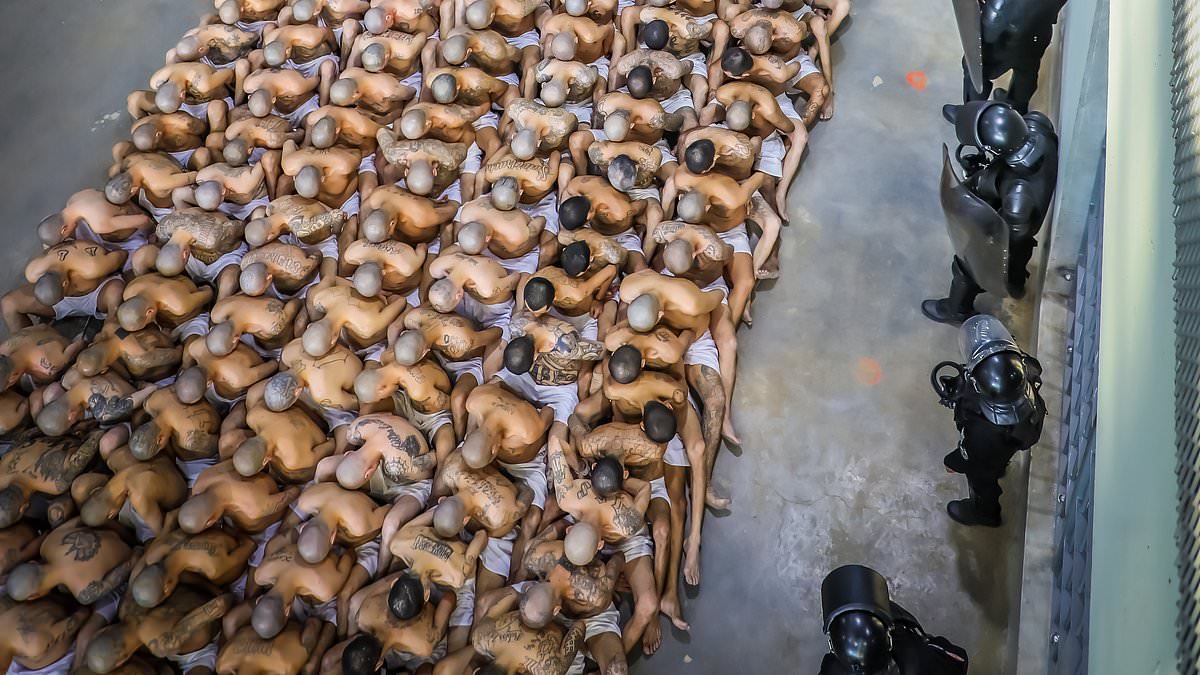El Salvador was once one of the most dangerous countries in the world, but today its murder rate has dropped by 98 per cent in a decade, and the US now considers it safer to visit than Britain or France.
In 2015, there were 6,656 murders in the small Central American country, which has a population of just 6.4 million. But in 2024, there were only 114 killings.
The dramatic change came after President Nayib Bukele, who brands himself as the ‘world’s coolest dictator’, launched an aggressive crackdown on crime.
In 2022, he declared a state of emergency, which remains in place. It gave security forces the power to arrest people without a warrant.
At one point, around 1,000 people a day were being detained on suspicion of gang involvement.
A year later, El Salvador opened a new prison called the Terrorism Confinement Centre – Cecot – to hold the growing number of detainees.
It was built in a remote area and is now one of the most extreme prisons in the world.
Inmates are banned from all contact with the outside world, and up to 100 men share a single cell.
They sleep on bare concrete slabs with no mattresses, and food is limited. There are no visitors, and prisoners are often transferred in chains, surrounded by armed guards.
Inmates are confined to their cells and are only allowed out for exercise in the prison’s corridors or video link hearings.
El Salvador now has the highest prison population per capita in the world, with nearly three per cent of all men in the country behind bars. US president Donald Trump has hailed Bukele’s policies, and the two have become close allies.
Before the crackdown, the country was dominated by two main gangs, MS-13 and Mara 18, which formed in California during the 1980s.
Many members were deported back to El Salvador in the 1990s and took control of large parts of the country.
Gangs extorted money from businesses, controlled entire neighbourhoods, and carried out brutal killings.
But that has changed since the leader’s rise. He campaigned on the promise to make the country safe, and his supporters say he has delivered.
Criminal gangs are not the only ones in his crosshairs. He introduced tougher penalties for petty crimes – anyone caught drink driving, even with a trace of alcohol, can be jailed for 15 days before facing a fast-track trial and up to five years in prison.
He has also surrounded entire towns with soldiers, doubled the size of the military, and expanded surveillance powers.
Checkpoints with troops carrying rifles have been set up, and cops go door to door in search of suspected criminals.
The tactic, which Bukele calls a ‘security fence,’ has been used in dozens of operations since 2022.
Bukele has also pushed legal reforms allowing judges to try dozens of suspects at once. Evidence can include anonymous tips or online posts.
In February 2025, Bukele signed a law which ordered children held for organised crimes to be sent to adult prisons.
According to Human Rights Watch, over 3,000 minors have been detained with little or no evidence.
The government has also introduced a national informant hotline, offering cash rewards to citizens who report suspected gang members.
Posters and text messages encourage neighbours and even relatives to turn people in. Critics say this has led to false accusations and revenge reports.
However, Bukele says the crackdown is ‘an example for other countries … that we can live in peace’. Aside from his war on crime, he has launched policies like making his country the first nation to declare Bitcoin legal tender and has improved the country’s infrastructure.
Last year, he was re-elected with 85 per cent of the vote in a controversial election. His main opposition got less than 7 per cent. In a recent move, Congress abolished the limit on presidential terms, allowing him to stay in power for life if re-elected.
Opposition congresswoman Marcela Villatoro said, ‘Democracy died today,’ after the reforms were passed by 57 votes to three.
Bukele’s supporters argue that the results speak for themselves and say locals and tourists now walk the streets safely at night, even in areas that were once no-go zones.
But his huge transformations have not come at a cost. He has been heavily criticised by human rights advocates who say he has committed many atrocities, especially when it comes to detainees.
In 2022, Amnesty International said: ‘Under the current state of emergency, the Salvadoran authorities have committed massive human rights violations, including thousands of arbitrary detentions and violations of due process, as well as torture and ill-treatment.’
